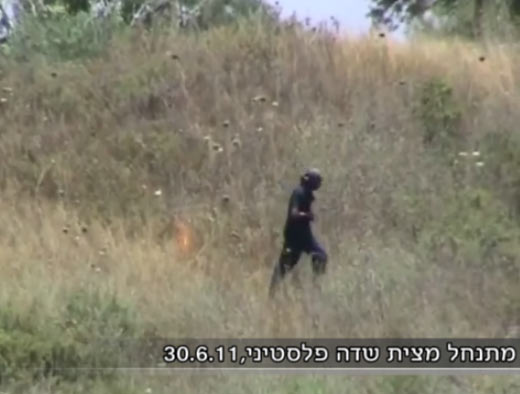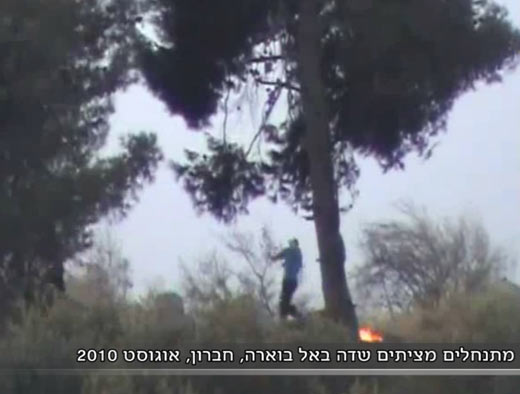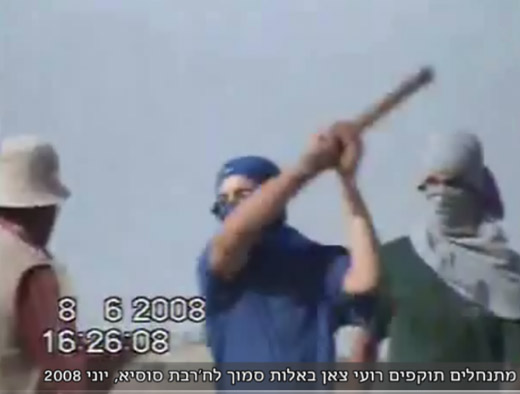Op-ed: B'Tselem field researchers say settler violence against Arabs a routine occurrence B'Tselem field researchers
Two mosques were torched here recently, in the villages of Yasuf and Brukin. Torching a mosque affects not only the villagers, and not only the situation in the West Bank, but the whole Muslim world. It's an affront to our religion. The residents here feel that the settlers are trying to turn the dispute into a religious issue. They are very angry and frustrated, especially because the Israeli authorities, who are supposed to protect us, have not found the perpetrators. Moreover, the authorities themselves have issued orders to demolish mosques. In the land near the Havat Gilad settlement, they damage olive trees, torch fields and steal Palestinian farmers’ crops all the time. B'Tselem volunteers have filmed settlers setting fields on fire on several occasions. The damage to the farmers is huge. For many of them, the land is the only source of income for their families. When the settlers steal crops or burn or destroy a grove, there is nobody to turn to for compensation, and the families have to make do with the little that's left. Large areas of land around settlements are out of bounds for the Palestinians who own the land. They are allowed access only once or twice a year, depending on coordination with the Civil Administration. Whenever the farmers go to their land, many of them discover all sorts of damage to it.
The worst thing is that people feel there is nobody protecting them, because the ones who are supposed to protect them actually act against them. Last summer, settlers torched fields next to the village of Far’ata. When I got there with a group of journalists, I saw that soldiers were preventing Palestinian firefighters from getting to the fire. The troops also prevented me and volunteers from filming and documenting the incident. We give video cameras to people living in such areas of ongoing friction, so they can try and document incidents themselves. Salma a-Debi, Nablus District In recent years, the violence in the Nablus area has come mostly from the Yizhar settlement. People there regularly attack the villages of Burin and Asira al-Qibliya. The last attack happened just four days ago, in Asira. Some villagers who live on the edge of the village, near the settlement, woke at 12:30 am to shouting and screaming. They realized, from past experience, that settlers were again attacking the village. It was a large group of settlers, and they were throwing stones at the houses. They broke the windows of a taxi parked in the street and tried to torch it. Soldiers who arrived at the spot apparently managed to prevent the torching. The taxi owner said that he would have to pay for the repair on his own. He depends on the taxi for a living. The villagers told me that they didn't sleep at all that night, and that the children didn't go to school the next day. The people in these villages feel isolated and unprotected in the face of these attacks. They know that the army is supposed to protect them, but when they ask for help, the soldiers often don’t intervene. In some cases, soldiers have even fired tear gas at villagers to get them to move away from the site, even though it's their village and the settlers are the ones who came there and attacked them. Families who live close to the settlement live in constant fear. They keep their windows closed even in summer, because they're afraid that settlers will try to burn down the house by throwing something through an open window. They never allow themselves to leave the house together, with the whole family going, but take turns staying at home to make sure that somebody is always there. In general, they don’t go out a lot, and when they do, they always return early out of fear that something has happened to the house. The children don’t sleep well, wet their bed at night, and wake up shouting, and demand that they sleep with their parents. They live in constant fear and always expect the worse. When they call the police, the policemen arrive late and don’t do what is needed. Many villagers have simply given up, and no longer waste their time complaining. Last week, I spoke with Umm Ayman, a resident of Burin who was assaulted by settlers. When I suggested that she file a complaint, she told me how, in 2008, settlers assaulted her, and she went with her baby daughter in her arms to file a complaint at the Ariel police station. She said that the police officers kept her there for hours and treated her with disrespect, and that nothing came of the complaint. So, why complain again? Musa Abu Hashhash, Hebron Hebron is an exceptional case, because the settlement was established inside the Palestinian city. This ongoing exposure to violence has a destructive influence on all the residents, and the children in particular. Families living in the center of the city, where the settlements are located, are especially exposed to physical and verbal violence by the settlers. Although it looks like they've gotten used to their abnormal situation, they still live in constant fear. Take, for example, the Abu Ayesha family, who live in the Tal Rumeida neighborhood. The children are worried all the time. They run along the road that leads to the house so that settlers who walk around in the street don’t grab and bother them. The Za’tari family, from the al-Bweirah neighborhood, alongside which the Mitzpe Avichai outpost was built, is subjected to stone throwing all the time and constantly feels exposed. They asked the municipality to install more lights outside the house.
Palestinians know that it is the Israeli authorities’ responsibility to protect them, but they have lost all trust in the police. Even when the police try to help, they can’t. It saddens me when people tell me that they feel such despair, that they have no choice but to protect themselves by counter violence, because the police are not doing its job. Nasser a-Nawaj’ah, Susiya, Southern Hebron Hills Settler violence is one of the gravest problems in the southern Hebron hills. This is a rural area, and many of the attacks are against shepherds. Almost every week, at least one attempted assault to prevent Palestinians from grazing their flock is recorded. The shepherds face stone throwers, who also yell at the sheep to get them to run away. They arrive with firearms and sometimes with clubs. At times, they bring their flocks to graze on Palestinian crops.
The army has provided a jeep with soldiers to accompany children to school on the road that passes close to the settlement Havat Maon. People here can’t understand why, instead of arresting the settlers whom they know are responsible for the attacks, the soldiers accompany the children. When soldiers are in the field, they sometimes take the settlers' side. They rarely try to separate the settlers from the Palestinians. Often, when the soldiers are new and don’t know the arrangements in the area, the settlers tell them that we're not allowed to be in a certain place, and the soldiers remove us, even though it is our land and we are allowed to be there. | ||||||||||||||
http://www.ynetnews.com/articles/0,7340,L-4166395,00.html











